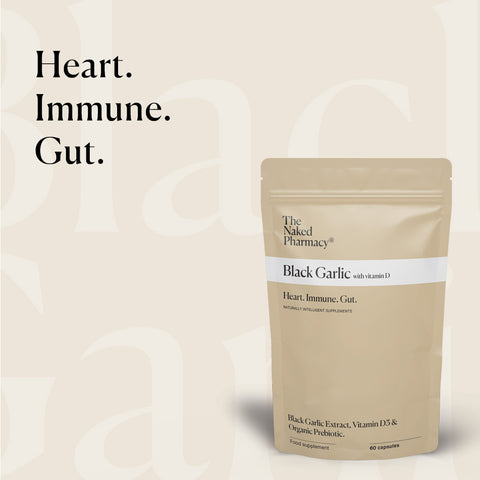Black Garlic
At The Naked Pharmacy, we ensure that all of our supplements are made with effective strength bioactives, so they are clinically proven to work.
We aim for each supplement to be scientifically supported by multiple randomised placebo-controlled studies. All clinical trial studies we use to support our supplements are undertaken on human patients, using the exact same dosage and formulation of the product. The scientific studies are published in peer review journals.
What can Black Garlic do for you?
Research is now showing that black garlic is a natural remedy for helping to maintain healthy blood pressure, as well as protecting the cardiovascular system.
S-Allyl cysteine has been clinically proven to effectively reduce cardiovascular risks and circulatory problems as well as support immune and gut health.(SAC) s-allyl cysteine is the primary bioactives in aged black garlic. It is an organic compound that is produced when white garlic is fermented over several months. It is a derivative of the amino acid cysteine in which an allyl group has been added to the sulphur atom.If you’d like for more information on the available evidence which details and supports the efficacy of aged black garlic, follow the links below.
The Studies
The scientific studies to support our claims on aged black garlic are published in the following peer review journals:
The aim of this study was to assess the effect of aged garlic extract on central blood pressure and arterial stiffness, both regarded as important risk factors for cardiovascular morbidity.
The authors concluded that aged black garlic extract is effective in reducing peripheral and central blood pressure in a large proportion of patients with uncontrolled hypertension, and has the potential to improve arterial stiffness, inflammation, and other cardiovascular markers in patients with elevated levels. Aged black garlic extract was highly tolerable with a high safety profile as a stand-alone or adjunctive antihypertensive treatment.
The aim of this study was to assess the effect, dose-response, tolerability and acceptability of different doses of aged garlic extract as an adjunct treatment to existing antihypertensive medication in patients with uncontrolled hypertension.
The authors concluded that aged black garlic extract is an effective and tolerable treatment in uncontrolled hypertension, and may be considered as a safe adjunct treatment to conventional antihypertensive therapy.
The aim of this study was to assess the effect of daily intake of a well-characterised Aged Black Garlic (ABG) extract with a standardized S-allyl-L-cysteine (SAC) yield in combination with dietary recommendations regarding CVD risk factors in individuals with moderate hypercholesterolemia.
The participants consumed 250 mg (1.25 mg SAC) of ABG a day or a placebo for 6 weeks, with 3 weeks of washout.At 6 weeks, ABG extract reduced diastolic blood pressure (DBP) compared to the placebo, particularly in men with a DBP > 75 mm Hg.
The authors concluded that the consumption of an improved ABG extract with 1.25 mg of SAC decreased DBP, particularly in men with moderate hypercholesterolemia. The potential beneficial effects of ABG may contribute to obtaining an optimal DBP.
The aim of this study was to evaluate the effects of Aged Garlic Extract (AGE) on the Quality Of Life (QOL) and immune functions of patients with advanced cancer. The study's subjects were patients with inoperable colorectal, liver, or pancreatic cancer. AGE was administered to one group and a placebo was administered to another for 6 months. The daily dose (4 capsules), contained 500 mg of AGE, the placebo capsules contained 951.5 mg of crystalline cellulose and 8.5 mg of sucrose fatty acid ester per 4 capsules.
The authors concluded that administering AGE did not improve QOL but caused improvements in the NK cell activity in patients with advanced cancer of the digestive system; this study shows AGE has immunomodulative and antioxidative properties.
Glossary of Terms
There are a few key terms to be aware of when reviewing these studies:
Randomised clinical trial: A clinical trial in which the participants are assigned randomly (by chance alone) to different treatments.
Double-blind study: A study in which neither the participants nor the experimenters know who is receiving a particular treatment. This procedure is utilized to prevent bias in research results.
Double-blind studies are particularly useful for preventing bias due to demand characteristics or the placebo effect.
Placebo: An inactive treatment used in a clinical trial, sometimes referred to as a “sugar pill.” A placebo-controlled trial compares a new treatment with a placebo, in order to give greater confidence that the result is only due to the test/active ingredient.
P-value: The probability of obtaining the observed results of a test. The lower the p-value is, the more confident we can be of a true result. For example, a p- value of 0.001 confirms a result as 99.9% accurate.







